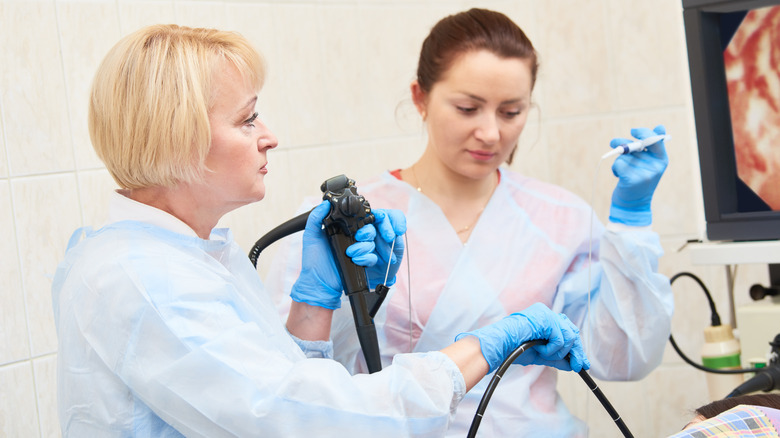GERD Explained: Symptoms, Causes, And Treatments
If you've ever suffered from that uncomfortable burning sensation that starts in your chest and climbs up your throat, you know how frustrating and irritating it can be. You're not alone in experiencing this burning feeling — about 20% of people in the U.S. have acid reflux, also known as gastroesophageal reflux disease (GERD), according to the National Institute of Diabetes and Digestive and Kidney Diseases. But what makes GERD more than just heartburn? Heartburn can be caused by gastroesophageal reflux (GER) — when the acids from your stomach come up into your esophagus. The frequency of this indigestion is what determines whether you are suffering from GER or GERD. GERD is more severe, occurs more frequently, and can lead to other issues.
To get more specific, GERD occurs when the muscle that separates your stomach from your esophagus — the lower esophageal sphincter – relaxes or opens, enabling stomach acid to travel back up toward the mouth (via Mayo Clinic). This causes the hallmark acidic, burning sensation as your stomach contents move upward. Over time, GERD can damage the lining of your esophagus and lead to other long-term problems. There are even different stages of GERD based on severity. Wondering what stage of GERD you are experiencing, or if it's just a case of indigestion? Let's discuss GERD symptoms, treatment options, and how you can avoid your GERD getting worse.
Symptoms and stages of GERD
So how do you know if you are experiencing GERD? The main symptoms are burping, heartburn, and reflux that has an acidic taste (via American Academy of Allergy Asthma and Immunology). But there are less common symptoms that you may not realize translate to GERD, including that lingering taste of your food in your mouth, difficulty swallowing, excess saliva, a chronic sore throat or cough, and laryngitis. You may also experience nausea, vomiting, regurgitation, or the sensation of a lump in your throat (via WebMD). Dental-related symptoms also include cavities, gum inflammation, wearing away of tooth enamel, and bad breath.
The symptoms can also vary based on the stage of GERD you are experiencing. The first stage is mild GERD, when acid reflux occurs once or twice a month and is managed by over-the-counter medications and some lifestyle changes (via Kansas Health System). Progressing to moderate GERD has you suffering more frequent symptoms that affect your daily life. Stage 3 is severe GERD, when your symptoms are painful and prescription medication doesn't help. Stage 4 is the worst stage: precancer or cancer. This occurs when GERD has progressed for so long it can develop precancerous lesions.
You will also want to pay attention to your heartburn and ensure it is not chest pain that might indicate a heart condition. Seek medical attention if you are unsure of the difference between the two.
How to know if you suffer from nighttime GERD
You may be thinking to yourself that none of the GERD stages fits your experience because yours happens at night. Many people report heartburn when they lay down to sleep (via the Sleep Foundation). This is common for a number of reasons, one of which being that when you are lying down, you no longer have gravity on your side helping you keep your stomach acid down. In addition, during deeper stages of sleep you don't swallow as much or produce as much saliva. So not only are your stomach contents not being forced back down as frequently, but less saliva means you're not able to neutralize the acids as well. Altogether, this means acid can creep up while you're trying to get some shut-eye, causing chest pain, coughing, and heartburn.
Along with regular GERD symptoms, nighttime GERD can also include new or worsening asthma conditions, as well as disrupted sleep (via the Mayo Clinic). In fact, 60% of people in a recent survey said that GERD affected their sleep, according to the Sleep Foundation. There is also a possible connection between GERD and obstructive sleep apnea, but it is unclear if GERD causes sleep apnea or vice versa. Either way, experiencing those pesky GERD symptoms can make sleeping soundly difficult
If you are a nighttime GERD-sufferer, there are some lifestyle changes that can help you avoid flare-ups. Avoid eating your meals late, prop up your bed at least six inches so you are not laying flat, and try sleeping on your left side, which research has found is the optimal position to avoid late-night reflux (via Sleep Foundation).
Potential complications of GERD
While there's no doubt that GERD is uncomfortable in the moment, it can also cause some long-term complications you should be aware of.
The main part of your body that is affected by GERD is your esophagus, as its tissue may become irritated or damaged by the escaped stomach acid. Esophagitis is when the tissues become inflamed, which can lead to ulcers and bleeding (via National Institute of Diabetes and Digestive and Kidney Diseases). More seriously, esophagitis can lead to conditions like esophageal stricture, which hampers your ability to swallow due to a narrow esophagus. Barrett's esophagus is also caused by GERD symptoms, and this condition is the main risk factor for developing esophageal cancer. When you develop Barrett's esophagus, damaged cells from your esophagus' tissue lining are replaced with tissue similar to that in your intestine. This change in cells can increase the risk of the formation of precancerous cells, or dysplasia (via Mayo Clinic). If left untreated, a type of cancer called esophageal adenocarcinoma can develop.
There are also other problems that can occur outside of your esophagus. You may also start to see your dental health decline as a result of GERD. Gum disease, an increase in cavities, as well as tooth erosion are some dental complications from stomach acid, according to Healthline.
Interactions of GERD and other health conditions
There are a number of health conditions that can increase someone's likelihood of developing GERD. For instance, people who already have asthma have a higher chance of experiencing GERD, according to the American Academy of Allergy, Asthma, and Immunology. This is because asthma flare-ups cause that lower esophageal sphincter to relax. The medication for your asthma may also cause your acid reflux to get worse. And in turn, GERD can make asthma worse due to lung irritation, which can also cause allergic reactions, chest congestion, a cough, postnasal drip, and even bronchitis.
Most pregnant women have experienced GERD or reflux symptoms at some point in their pregnancy, many times worsening the further along they are (via University of Michigan Health). During pregnancy your hormones slow down your digestive system, along with the muscles that help food travel down your esophagus. Your growing belly can also be the culprit, as your uterus crowds the stomach, potentially pushing stomach acid up.
GERD is also more likely for those with hiatal hernias, as experts say they can weaken your lower esophageal sphincter (per WebMD). Hiatal hernias are most common in people over 50 years old, and they occur when the upper stomach moves into the chest through the diaphragm. GERD can be tricky to diagnose in those with hiatal hernias, as they may not have typical symptoms like heartburn, but your stomach contents will make their way into your esophagus. Finally, research has also shown that people with irritable bowel syndrome are more likely to have GERD symptoms than those in the general population (via Healthline).
Fussy baby? It could be acid reflux or GERD
If you have been a parent to a colicky baby, you probably already know that little ones can suffer from GER or GERD, too. Experts say about 70-85% of infants have symptoms like regurgitation or reflux by the time they are two months old (via National Institute of Diabetes and Digestive and Kidney Diseases), which is pretty unsurprising when you think about it. For one thing, a newborn's lower esophageal sphincter is not yet at full strength, making it less effective at keeping food down (via Mayo Clinic). Combined with the fact that babies are lying down a lot and take in basically nothing but liquid, it's a recipe for reflux. Though most babies will have reflux at some point, some infants are more likely than others to develop GERD. It has been reported that GERD is more common in premature babies, as well as infants with health issues of the esophagus, lungs or nervous system.
It can be hard to determine if your baby is suffering from reflux. Some telltale signs are frequent, forceful spit-ups, and if the fluid is bloody, green, or yellow. If they don't seem to want to eat or become uncomfortable or irritated after eating, that can also be a sign of GERD. Your doctor will also want to keep an eye on their weight — if they're not plumping up as they should, it could be another symptom. The good news is that, in most cases, there isn't much need for concern. An infant's stomach contents typically don't have enough acid to cause irritation of the throat or esophagus, according to the Mayo Clinic. And most children grow out of the symptoms by the time they are a year to 14 months old (per the National Institute of Diabetes and Digestive and Kidney Diseases). However, you should always discuss any concerns with your pediatrician, especially if reflux symptoms persist after 14 months.
How doctors diagnose GERD
Doctors have numerous ways to diagnose GERD. Some tactics are as simple as reviewing your medical history and symptoms to form a plan of care (via National Institute of Diabetes and Digestive and Kidney Diseases). However, some testing may be ordered if you have other medical issues from GERD, or if you have tried over-the-counter medications and lifestyle changes but still have no positive results to report.
An endoscopy of your upper gastrointestinal tract will enable your doctor to see your esophagus and stomach via a small camera on a flexible tube that is put down your throat. Doctors may also monitor the pH levels in your esophagus to detect stomach acid. This testing is done by catheter monitoring through your nose and into your esophagus, or by capsule monitoring, where an endoscope places a wireless capsule on your esophagus lining to measure your acid reflux.
Another option doctors may use for GERD diagnosis is a barium swallow, where X-rays are taken of your upper GI system after you drink a barium solution (via Healthline). They may also capture the strength of your esophagus muscles with an esophageal manometry, which also involves a doctor inserting a tube in your throat. If your medical team finds it necessary, they can also use take a tissue sample for a biopsy during an endoscopy procedure. While the GERD diagnosis process can seem daunting, it will get you one step closer to getting the treatment you need for your acid reflux.
Food and lifestyle changes to help with GERD
As a first line of treatment, your doctor may recommend some lifestyle changes to keep GERD at bay. Some lucky people can beat GERD by avoiding their "trigger foods" (via Healthline). While these foods vary by person, typical triggers include high-fat items like fried foods or full-fat dairy products, spicy dishes, as well as acidic foods like citrus, tomato, and pineapple. You will also want to avoid large amounts of caffeine like coffee or tea, as well as alcohol and soda. Timing of your meals is also key, according to Healthline. You will want to avoid eating before laying down for at least two hours, as well as eat smaller, more frequent meals. It is also key to eat slowly, chewing thoroughly to give your stomach time to digest fully.
It can also help to avoid wearing tight clothing to reduce pressure on your stomach, and generally to lose weight around your midsection (via NYU Langone). If smoking is your vice, GERD is another reason to quit. Smoking can increase your stomach acid production, decrease the saliva needed to neutralize that acid, and hamper your lower esophageal sphincter function. Reducing your stress is also important, as anxiety can cause some GERD flare-ups (via Healthline).
It is important to note that everyone is different and your specific GERD case may not be placated by food and lifestyle changes alone. Be sure to consult with your medical team about the best options for you, as prescription or over-the-counter medication may be necessary.
Treatment options for GERD symptoms
So how can you treat GERD? Over-the-counter antacids may be recommended by your doctor as a first line of defense, but shouldn't be used daily for severe symptoms (via National Institute of Diabetes and Digestive and Kidney Diseases). Some herbs like chamomile, licorice root, and marshmallow root are commonly used to keep symptoms at bay, according to Healthline, though the efficacy of herbal remedies to treat GERD require more research. In a more severe case, your doctor may prescribe an H2 blocker like Famotidine, or a proton pump inhibitor like Omeprazole. While both types of medication work to decrease your stomach acid levels, proton pump inhibitors may be preferred, as they treat GERD symptoms and repair your esophageal lining more effectively than H2 blockers.
If medication or lifestyle changes don't do the trick, your doctor may suggest a surgical procedure (via National Institute of Diabetes and Digestive and Kidney Diseases). Fundoplication is the most common procedure — in this surgery, your stomach is sewn around the end of your esophagus with the goal of adding pressure to the lower esophageal sphincter. Patients with GERD who are also obese may be good candidates for bariatric surgery or gastric bypass surgery, as weight loss can also provide GERD relief. Endoscopy procedures are also a possibility.
Another option is the LINX device. This is a ring of small magnetic beads that is placed around the stomach and esophagus — the magnetic connection between the beads is forceful enough to prevent reflux, but not so strong that food cannot pass through (via Mayo Clinic). Another newer procedure is a transoral incisionless fundoplication, which partially encloses the lower esophagus with polypropylene fasteners.
When to see a doctor for your GERD
Heartburn or acid reflux can be a normal occurrence for many — especially if you have overindulged on some trigger foods. But there is a point when it is necessary to seek additional medical attention for your GERD. Unexplained weight loss, internal bleeding, or difficulty swallowing are red flags that you need to see a doctor (via American Society for Gastrointestinal Endoscopy). Stomach pain, vomiting, diarrhea, and bloody or black stools are also signs that your GERD needs medical attention (via WebMD). And according to the Mayo Clinic, if you're taking over-the-counter medications more than two times a week to keep your heartburn or acid reflux at bay, it's time to make an appointment.
Also watch out for certain symptoms of GERD that can also signify a more serious condition. If you have shortness of breath, jaw or arm pain, and chest pain you should get medical attention immediately, as these could be signs of a heart attack (via Mayo Clinic).










